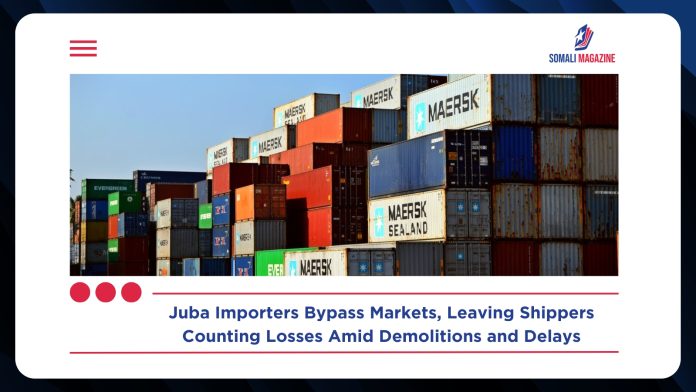Facebook Twitter (X) Instagram Somali Magazine - People's Magazine
From docks to homes, shops: Juba importers leave shippers counting losses, as a wave of disruptions in South Sudan’s capital continues to wreak havoc on supply chains, leaving warehouses clogged, cargo stranded, and traders scrambling to salvage their businesses. The ripple effect of insecurity, poor coordination, and sudden policy shifts has turned Juba’s once-thriving import sector into a logistical nightmare.
At the heart of the crisis is the growing trend of importers bypassing formal distribution channels, opting instead to redirect goods straight from customs yards to homes and informal shops. This shift, driven by fear of looting, arbitrary demolitions, and rising taxes, has left shipping companies and clearing agents counting millions in losses.
Recent demolitions in Gudele 1 Market by the Juba City Council (JCC) have intensified the chaos. Traders were caught off guard when bulldozers rolled in without prior notice, destroying shops and merchandise. “We pay all fees—licenses, garbage, security—but they came and silenced us,” lamented Faiza, a vendor whose goods were crushed during the operation.
The Chamber of Commerce has condemned the demolitions, calling them “irresponsible” and warning that such actions undermine investor confidence. “You cannot tax traders and then destroy their businesses without warning,” said Robert Francis Pitia, Chairperson of the Central Equatoria State Chamber of Commerce.
Meanwhile, cargo destined for Juba continues to pile up at Kenya’s Mombasa port and Nairobi’s inland depots. The Kenya Revenue Authority has threatened to auction over 85 lots of unclaimed goods, citing overstays and unpaid fees. Importers blame rogue clearing agents and South Sudan’s cumbersome Electronic Cargo Tracking Note (ECTN) system, which demands $350 per consignment.

Security concerns have further complicated the situation. Truckers have suspended deliveries to Juba following repeated attacks on drivers along the Nimule-Juba highway. The Kenya Transporters Association reports that more than 5,000 truckers have halted operations, citing lawlessness and lack of protection.
The result is a fractured supply chain where goods are rerouted, delayed, or abandoned. Some traders have resorted to hiring private vehicles to transport goods directly to homes or informal outlets, bypassing traditional markets altogether. This workaround, while offering short-term relief, has led to inventory mismatches, pricing distortions, and increased risk of theft.
Economists warn that the breakdown in formal trade channels could deepen South Sudan’s economic woes. “When goods skip regulated markets, it affects tax collection, consumer protection, and overall stability,” said Daniel Bol, a Juba-based analyst.
Despite the turmoil, signs of resilience persist. Community groups are offering microloans and security patrols to help traders rebuild. The Chamber of Commerce is exploring legal action against the JCC and working to allocate temporary spaces for displaced vendors.
As Juba’s import ecosystem teeters on the edge, stakeholders are calling for urgent reforms—better coordination between city authorities and traders, streamlined customs procedures, and enhanced security along key transport routes. Without these measures, the losses will continue to mount, and the city’s economic recovery will remain elusive.

